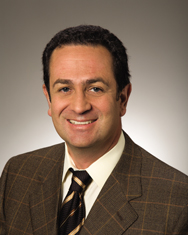Cooper University Health Care is the first health system in South Jersey to offer a new diagnostic test to detect recurrent prostate cancer earlier. Axumin is an FDA-approved scan that can achieve early detection of recurrent prostate cancer following surgery or radiation.

Robert A Somer, MD
“While prostate cancer is consistently one of the top three cancers in the nation, there have been very few effective advances in imaging for this disease,” said Robert A. Somer, MD, head of the Division of Hematology/Medical Oncology at MD Anderson Cancer Center at Cooper. “This new tool might give us the advantage of detecting recurrent or metastatic disease and potentially treating recurrence differently.”
Other than skin cancer, prostate cancer is the most common cancer in American men. According to the American Cancer Society, nearly 175,000 new cases will be diagnosed in the United States in 2019, with about 31,620 deaths from prostate cancer.
Prostate cancer is typically detected with the use of blood tests such as the prostate-specific antigen test (PSA). PSA is a protein produced by both cancerous and noncancerous tissue in the prostate, a small gland that sits below a man’s bladder. Standard body and bone scans typically are unable to determine the location of the cancer until the PSA level is excessively elevated.

Todd L Siegal, MD
Axumin can detect recurrent disease with PSA levels at much lower levels. By continually monitoring PSA levels in men who have been previously diagnosed with prostate cancer, Axumin can be used as soon as PSA levels begin trending upward, leading to quicker detection.
“Other imaging methods rely on physical changes in the body, whereas Axumin detects changes on the physiological level, which can develop weeks, even months earlier than physical changes,” said Todd Siegal, MD, interim chief of Radiology at Cooper. “It ultimately presents a huge opportunity to fill the void in detecting early recurrence of prostate cancer.”
About MD Anderson Cancer Center at Cooper
Cooper University Health Care and The University of Texas MD Anderson Cancer Center – a world-renowned cancer center – have partnered to create MD Anderson Cancer Center at Cooper. The physicians at MD Anderson at Cooper adhere to the practice standards, treatment protocols, and guidelines set by MD Anderson in Houston, Texas. Disease-site specific multidisciplinary teams consisting of physicians, nurses, and other clinical specialists work together to provide cancer patients with advanced diagnostic and treatment technologies, access to a wide range of groundbreaking clinical trials, and dynamic patient-physician relationships. A full complement of support services provides complete, compassionate care for our patients.
####
Wendy A. Marano
Public Relations Manager
marano-wendy@cooperhealth.edu
856.382.6463
